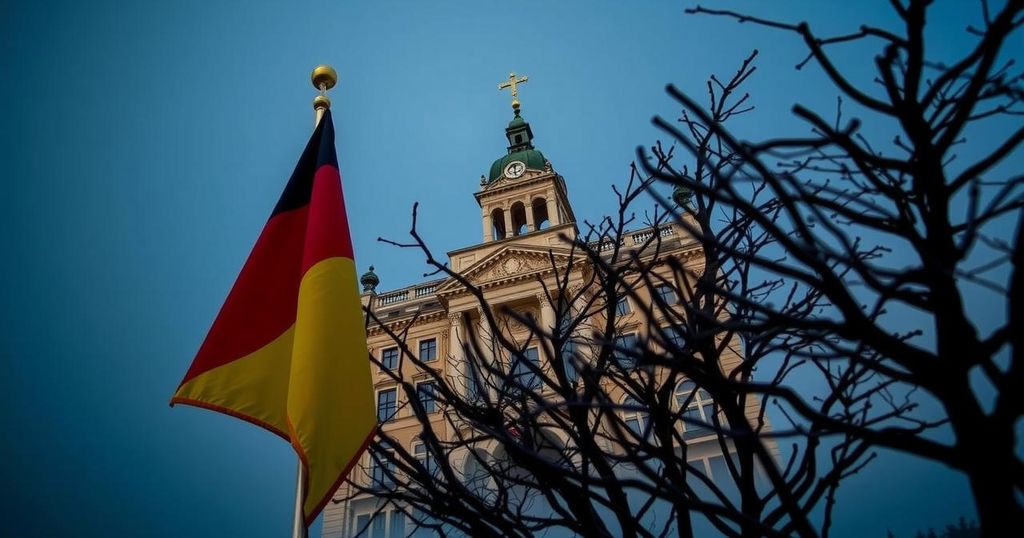World news
ANGELA MERKEL, ASIA, BUNDESTAG, CHINA, CHRISTIAN DEMOCRATIC UNION, CHRISTIAN SOCIAL UNION, DEFENSE SPENDING, DEMONSTRATIONS, EUROPE, EUROPE/ASIA, EUROPEAN UNION, GAZA, GAZA STRIP, GERMANY, ISRAEL, MEXICO, NORTH AMERICA, OLAF SCHOLZ, POLITICS, RUSSIA, SCHOLZ, SPD, STEINMEIER, UKRAINE, UNITED STATES, US PRESIDENTIAL ELECTION, WALTER STEINMEIER
Li Chen
0 Comments
Germany to Hold Snap Elections on February 23 Following Coalition Collapse
Germany has scheduled snap elections for February 23, following the collapse of Chancellor Olaf Scholz’s coalition. President Steinmeier supported this timeline, advocating for cooperation among parties during the transitional phase. Key issues including economic instability and rising political polarization intensify the urgency of the elections.
Germany is poised to conduct snap elections on February 23, following the recent dissolution of Chancellor Olaf Scholz’s three-party coalition government. This election date, reached in a mutual agreement between the two largest political factions, emerges as a compromise; the opposition coalition aims to avert government paralysis by advocating for an earlier vote, whereas Scholz sought a later timeline to afford more preparation time for parties involved. The anticipated elections stem from a series of unfortunate events, including Scholz’s expected loss during a confidence vote scheduled for December 16. Should the vote not yield favorable results, President Frank-Walter Steinmeier is mandated to dissolve the Bundestag within 21 days. Steinmeier endorsed the February timeline as “realistic” and urged all political parties to maintain responsible collaboration to ensure national security during this transitional period. Concurrently, Germany’s economic landscape faces significant challenges, including the effects of persistent inflation, geopolitical tensions from Russia’s actions in Ukraine, and increased competition from international markets. The recent political turmoil may lead to a leadership void in the European Union, particularly as member states work collaboratively to address these pressing issues. Scholz’s dismissal of Finance Minister Christian Lindner, a critical figure aligned with the Free Democratic Party, precipitated the government’s collapse. As political dynamics shift, the rise of the far-right Alternative for Germany (AfD) party has become increasingly pronounced, garnering nearly 20% in surveys. Meanwhile, the center-right CDU/CSU coalition holds a lead at 32%. Despite pressure within the Social Democratic Party to consider more popular candidates for leadership, there remains strong support for Scholz among his party members, advocating for his experience and competence in navigating Germany’s challenges.
The context of the upcoming snap elections in Germany arises from the breakdown of Chancellor Olaf Scholz’s coalition government, which included his Social Democratic Party along with the Greens and Free Democratic Party. The collapse was significantly influenced by disagreements over fiscal policies, particularly after the dismissal of the FDP’s Finance Minister. The political scenario is further complicated by external factors such as economic instability linked to inflation and geopolitical tensions, necessitating a stable government to address these challenges effectively. Furthermore, the political landscape in Germany continues to evolve, with rising factions complicating traditional party alliances.
In conclusion, Germany’s imminent snap elections represent a critical juncture for the nation as it copes with internal political instability and external pressures. The decision to hold elections on February 23 aims to restore governmental unity amidst economic challenges and rising populism. As parties prepare for a campaign in less favorable weather conditions, the political atmosphere remains charged, with the potential to reshape the governance structure and responses to significant contemporary issues.
Original Source: www.aljazeera.com



Post Comment